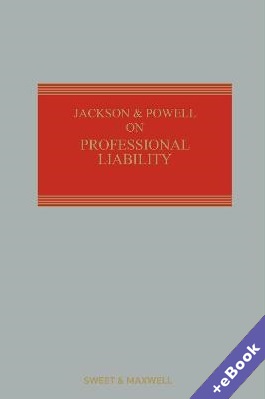Jackson & Powell on Professional Liability 9th ed (Book & eBook Pack)
ISBN13: 9780414090415
Published: December 2021
Publisher: Sweet & Maxwell Ltd
Country of Publication: UK
Format: Book & eBook Pack
(ProView)
Price: Out of print
The amount of VAT charged may change depending on your location of use.
The sale of some eBooks are restricted to certain countries. To alert you to such restrictions, please select the country of the billing address of your credit or debit card you wish to use for payment.
Sale allowed in
Anguilla, Antigua and Barbuda, Aruba, Austria, Bahamas, Barbados, Belgium, Bermuda, Bulgaria, Cayman Islands, Croatia, Cuba, Cyprus, Czech Republic, Denmark, Dominica, Dominican Republic, Finland, France, Germany, Gibraltar, Greece, Grenada, Guadeloupe, Guernsey, Guyana, Haiti, Hungary, Ireland, Italy, Jamaica, Jersey, Latvia, Liechtenstein, Lithuania, Luxembourg, Malta, Martinique, Montserrat, Netherlands, Poland, Portugal, Puerto Rico, Romania, Saint Kitts and Nevis, Saint Lucia, Saint Vincent and the Grenadines, Slovakia, Slovenia, Spain, Sweden, Trinidad and Tobago, Turks and Caicos Islands, United Kingdom, Virgin Islands (British), Virgin Islands (U.S.)
Sorry, due to territorial restrictions applied by the publisher we are unable to supply this eBook to United States.
Jackson & Powell is the definitive text on Professional Liability. It provides comprehensive coverage of the law of professional liability. It is an essential reference point for every practitioner as it aids them in establishing whether a duty of care exists and whether it has been breached, providing quick access with confidence as to whether a cause of action exists while explaining the remedies available.
Key features
- Examines the nature of professional liability
- Deals with subjects of general application and delves into specific professions
- Discusses the difference between tortious liability and contractual liability
- Considers the duties and obligations of a professional including positive duties and restrictions
- Considers the standard of skill and care including the relevance of the defendant’s qualifications and experience
- Discusses changes in the standard required by professional
- Explains the nature of a fiduciary duty including unauthorised profits and undue influence
- Discusses the origins of the duty of confidentiality including the continuing duty to former clients
- Differentiates between limitation in contract, tort and equity
The new edition addresses all key developments and case law that have evolved since publication of the 4th Supplement to the 8th edition in December 2020. It includes the following significant new cases and developments, including the following:
Insurance. In Lord Bishop of Leeds v Dixon Coles & Gill the Court of Appeal gave further guidance in relation to aggregation. It held that liabilities to different clients arising from thefts from the insured firm’s client account by a partner should not be aggregated as they did not arise out of a series of related acts or omissions.
Scope of duty. The decisions of the Supreme Court in Manchester Building Society v Grant Thornton UK LLP, an accountants’ case, and Meadows v Khan, a medical case, provide significant guidance and refinement of the scope of duty principle, concentrating on the purpose of the advice objectively construed. This is relevant to claims against most professionals.
Surveyors. In Hart v Large the Court of Appeal upheld a decision that a negligent surveyor was liable for the difference in value between the purchase price and the actual value of the property with all the defects, including latent defects, as his advice should have advised that there were risks which could not be assessed.
Lawyers: In Harcus Sinclair llp v Your Lawyers Ltd the Supreme Court has for the first time reviewed the law on solicitors’ undertakings. It has provided significant further guidance on the questions to be asked to determine whether an undertaking was given as a solicitor.
Financial practitioners. Adams v Options SIPP UK LLP has significant ramifications for execution only SIPP providers. The Court of Appeal reviewed earlier High Court authority to the effect that the giving of mere information may constitute advice where the provision of information is itself the product of a selection process involving a value judgment.
